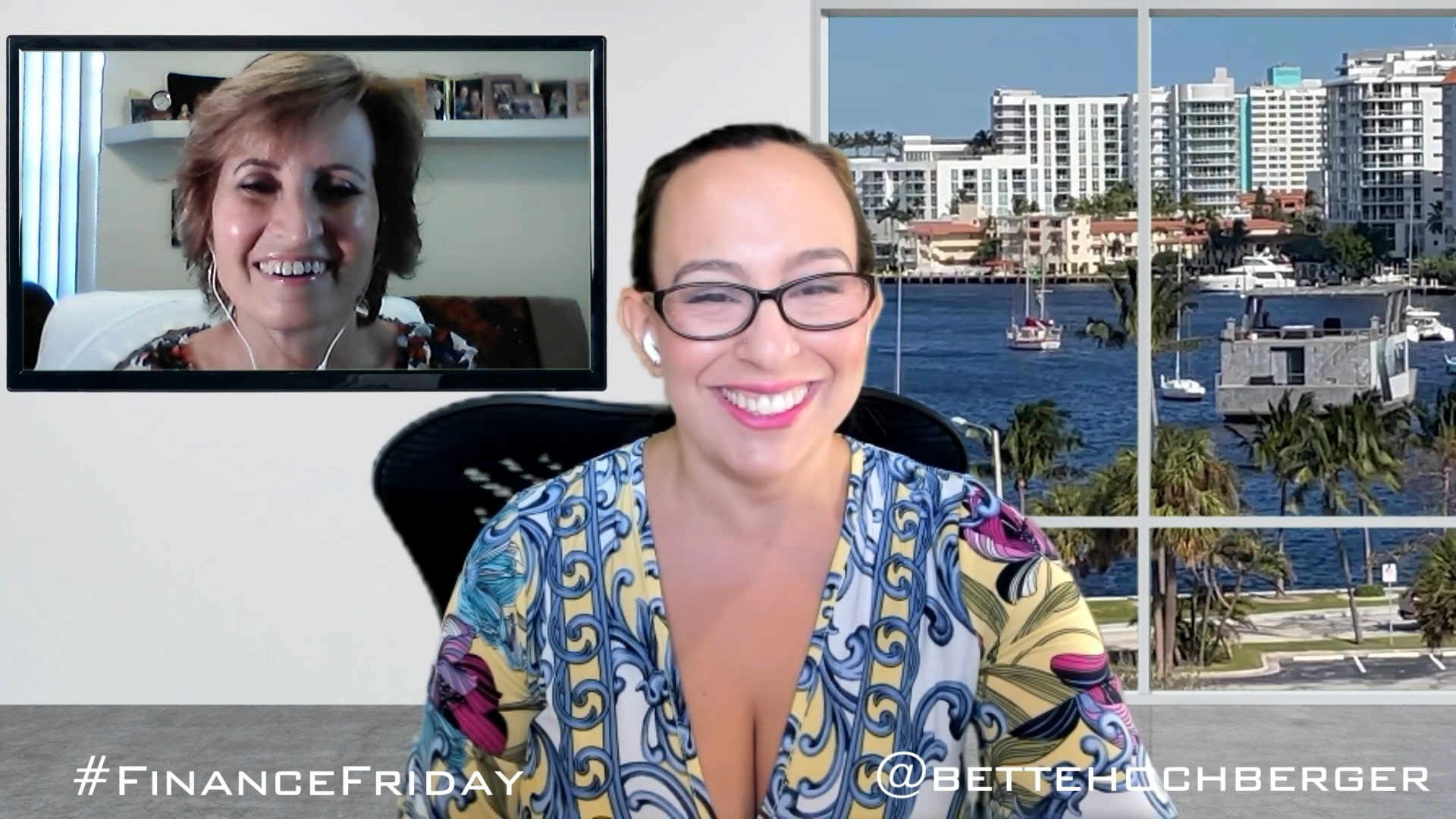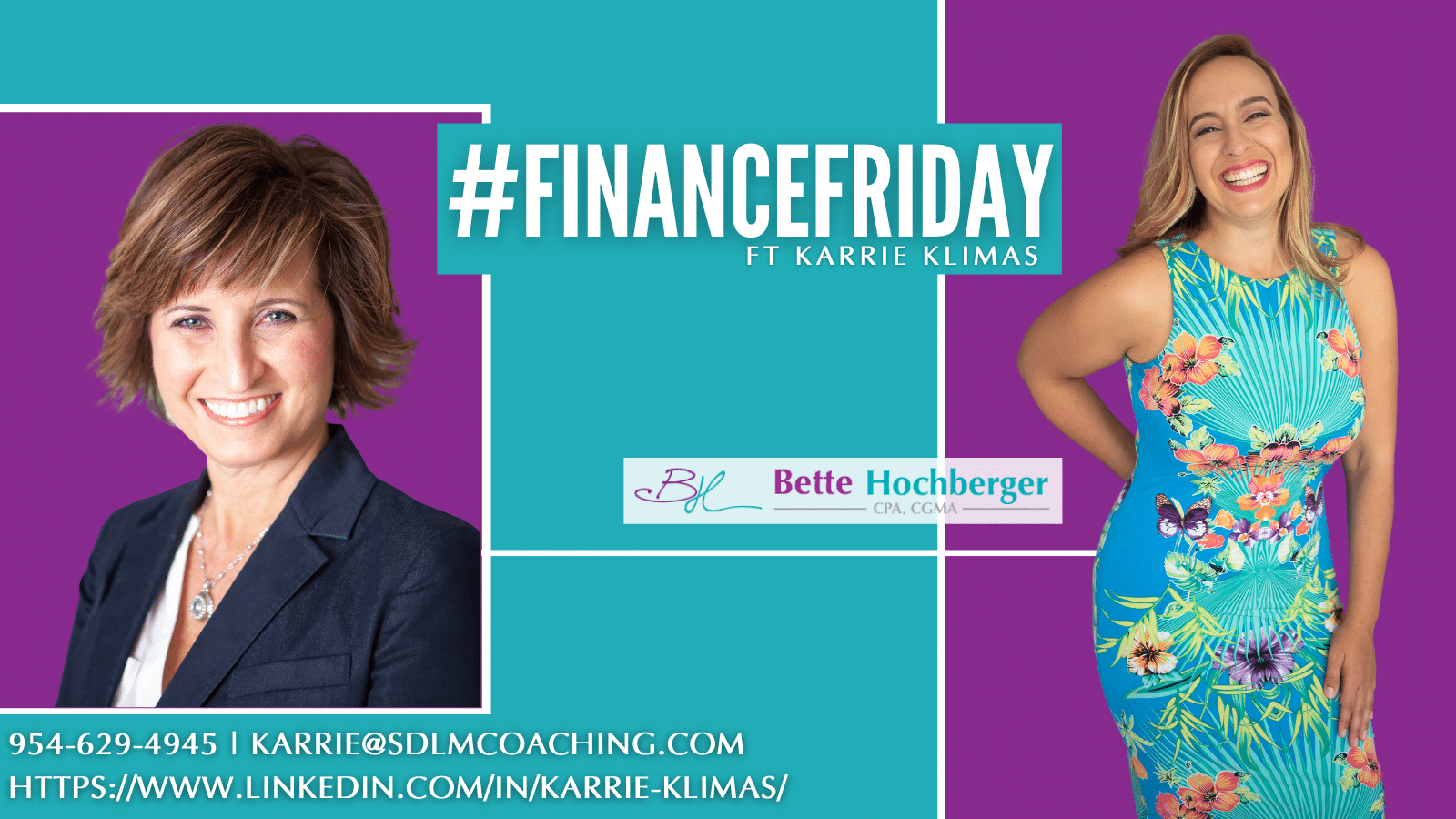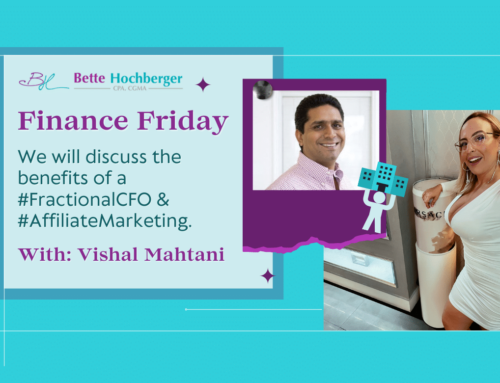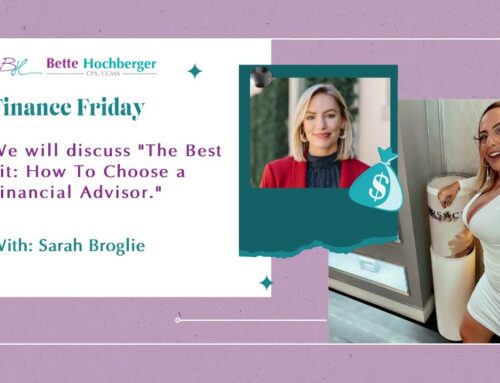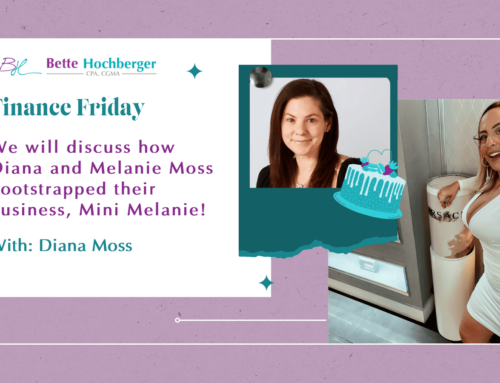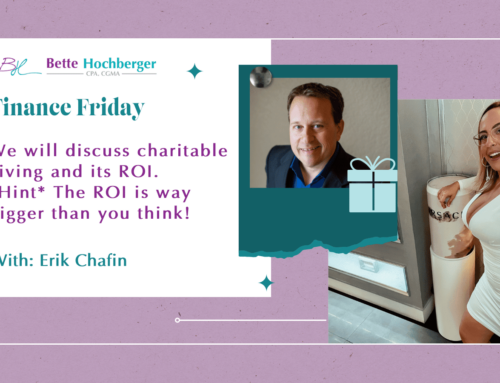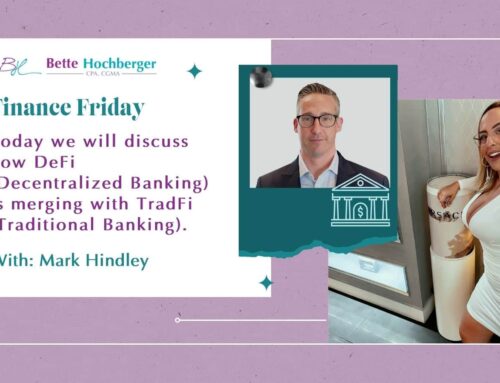Bette Hochberger:
Hi, I’m Bette Hochberger, CPA, CGMA. And on today’s #FinanceFriday, we have a special guest, Karrie Klimas. Carrie is an expert in communications and she’s going to share with us today some fantastic tips for better business networking. Obviously, things have changed with COVID and Zoom and all that, but what are things that are tried and true best practices, even in an age of COVID, even in an age of Zoom, for networking? Because I’m sure everybody can do it better, myself included.
Karrie Klimas:
Of course, of course. Well, I’ll give myself this. I am a cold lead trainer for our communications workshop called Great People Skills: Skills for Being Great People. I’ll give myself that little plug plus reasons why I can also share this since we got to call ourselves experts so why not give myself that permission? As well as a self discovery life mastery coach. But I’ll say when it comes to business networking, the goal for us, even in self discovery, is trying to get you to pay more attention. If you can get your attention acting like being curious and acting like an explorer, being open to see what people are doing and having conversations. Most people might … too much in their head, judging themselves and putting themselves in fear rather than being open to take the chance to see who else is out there and connect to people.
Bette Hochberger:
I got to say, that is definitely a problem I have. I talk to people and the whole time I’m like, “Oh, God. Wait. I forgot their name already. What did they say they do? When do I have to pick up my kids?” And I’m having this whole thing. I’m just smiling and nodding and at the end I’m like, “Oh, God. I should have been paying attention.” Are there any techniques that we could do to do better at that? Especially me. I really need to know.
Karrie Klimas:
We’re going to train you how to discipline your intentions so you can be more present and more aware of what’s actually being said and the person in front of you and trusting yourself you can retain more. Whether you do or you don’t, don’t make yourself feel bad that you didn’t. Honey, don’t beat yourself up.
Bette Hochberger:
Don’t beat yourself up. I know. We’re all very hard on ourselves. We should be a little nicer. What about after you go to some business networking event …. I can’t tell you how many times I’ve gone and you get this stack of business cards and it’s like crickets. I guess you got to be a little bit more proactive. What’s a good follow-up system if you’re networking?
Karrie Klimas:
Learn to be more deliberate. I was at a business networking event last night and so I’ve got a … I’ve been business networking for 10 years and so always looking for a way to keep those business cards organized so I get a three ring notebook like the kids use. A notebook. And I staple five cards on a page and next to the cards or on the cards I actually might write the day I met them, where I met them, maybe some little notes because this way I can follow-up with them and then if I don’t hear back from them ever … I might try three or four times to connect and if I don’t talk to them or hear back a word or peep, I can rip that card back out. And the ones I do prefer, that I’ve heard from and keep following up with can stay in that notebook.
Bette Hochberger:
That’s interesting. Do you think it’s better to do it in a manual format like that versus trying to maybe do digital? I know I’ve tried so many times to organize digital business cards and it’s a challenge to keep up with it and maintain it and do all that kind of stuff.
Karrie Klimas:
In my world, I trust everybody would like to save some time. Now, if you really, really, really want to do that … For me … Why not for me? I keep their business card because their information is there. If I did make a connection, then I’d put their information in my phone, maybe like a Google Calendar and make an event and say, “Hey, I spoke to this person,” then wrote the date and place where I met them and follow along my sense of a second or third contact. But for me to keep doing more work, why do I want to keep putting more work on my plate? I’d rather take the card. Take it, no response after three or four times and delete them. I don’t need to put it up in a database and if they become a client there’s a chance I’ll put them in a database.
Bette Hochberger:
But that’s awesome. That’s a great way to avoid digital clutter because I know one of the things … I end up with so many contacts and I’m like, “Who is this person?” Don’t remember. Were they ever a client? Did I meet them somewhere? That’s kind of a great idea to not necessarily throw them in right away and just see because sometimes people are just being nice when they’re at a business networking event and they don’t really have any interest in ever talking to you again.
Karrie Klimas:
Right, so the goal … Yeah, I would definitely put the ones you were feeling interested.
Bette Hochberger:
Right.
Karrie Klimas:
Keep them in the book and if they don’t feel interesting after check in … Did you put the date there? Check in with yourself. A couple months. If you never heard a peep back, you called them, you emailed them, you text them … You did all forms of communication.
Bette Hochberger:
Yeah.
Karrie Klimas:
If you’re not getting a response … But I’ll also say a lot of people just email people trying to get … to say, “Here’s all my information.” My goal would be set up a time to meet for coffee or have a Zoom because it’s really not about tossing out more of your information as it’s about getting to know each other. I always encourage people to say, “I want to get to know more about you, as well,” because I just have your card and they’re going to say maybe no to me, they might be interested in what I offer, but I don’t even know who you are so if somebody might need your services, I never met you. But the person who did take the time to make for coffee or Zoom most likely will get my business first because right now you’re just a person on a card and you really didn’t take the time to get to know me and I didn’t get a chance to know you, either.
Bette Hochberger:
And that goes back to the idea of people do business with people; they don’t necessarily do business with a business. So, if they know you and you have a relationship, even if it’s not such a strong one … I’ve had people refer clients to me or even people who I met years ago, they’re like, “Oh, I still have your card. I met you at something,” and call me up. And I’m always surprised. I’m like, “Really, you remember me from then?” I don’t remember what I had for breakfast so I don’t have the best memory. But no, it’s definitely important. I think those interpersonal skills and those connections and learning how to systematize it, like you’re talking about, I think is just brilliant. And having that deliberate communication and that deliberate follow-up I think would be an amazing thing for anyone who’s trying to grow a business. Or even if you’re … just been doing it for a long time, do it better.
Karrie Klimas:
Yeah. And I’ll say, too … I’ll say in 2018 I started … I got one of these $11 books at the calendars and I was writing more stuff. Why would I keep somebody that had no interest? A couple years later, I just got a dollar store calendar, small, little one, and I just wrote the people that were interested in our workshops or whatever; just put their name in that date. Why do I need to have this whole book of people who aren’t interested? I’d rather keep my attention on the people who were interested and put their name in a space that I can remember. Simplify life because you’d rather have more time to spend … things you need to enjoy rather than putting all this work in for people who may or may not want what you have to offer. But take that first step and then get it moving forward. Then send them an email if they agree to get on your database for that, too.
Bette Hochberger:
That’s awesome. I think that’s great advice. Does anything change with COVID-19 and Zoom and any of that as far as networking? Or if you’re doing any online business networking, which I tried a couple and didn’t really love it. But does it really greatly affect now you do things versus in the real world?
Karrie Klimas:
Everything has to be a follow-up. There’s always an intention. Yesterday, I attended two virtual Zoom calls from a group called Happy Neighborhood Project back to back and then I went last night to a face-to-face event, so my intention … and if just everybody would consider having an intention going in, meeting, walking away with two or more people that actually want to have a one-on-one with you. Why would you do something and not plan to have a following afterwards? An intention to get something moving forward? I’ll say the virtual people that I’ve been finding out since I’ve been virtually business networking since July more deliberately is … Because I have that Calendly.com … I put about $10 a month at Calendly. When I do a lot of the virtual, my information is in the chat. And then yesterday I walked away with three people finding me on LinkedIn, messaged me and said they want to have a one-on-one.
Karrie Klimas:
I didn’t even click on anybody’s calendar. They found me, messaged me and then they just clicked on my calendar link or they saved it and next thing you know, they’re on my calendar. And face-to-face I’m going to say takes a little bit longer. I feel like when you do it virtual, people are more deliberate. “Yeah, give me your calendar. Let’s leverage our time.” Boom. And I message people my calendar. Sometimes I don’t always see that but I still call and check in with people and sometimes they get distracted, but …
Bette Hochberger:
Really? People get distracted? What are they getting distracted by? But that’s interesting that you’re finding that it’s actually a little easier to do it online. I would think that the in-person business networking would be better. You have the more social cues and the eye contact and all that stuff I would think would be better. But I don’t know. Maybe just the fact that at your fingertips, literally, when you’re on a computer it’s very easy to get on somebody’s calendar.
Karrie Klimas:
Yeah, that’s what I was going to say. The group I was with was a women’s group and only had two breakout rooms. People messaged me. They weren’t even in my breakout room. They saw my name in the side, in the main chatroom. They obviously saw my calendar. They took the time to reach out to me and friend request me and want to have a one-on-one. Why would I not take the opportunity to do that? Reply. If somebody’s reaching out to me, would I spend 30 minutes? What do I have to lose? I’d rather take an opportunity to put my contact information. They didn’t even meet me and they’re willing to … they want to meet me. Okay, great. Let’s see where that takes us.
Bette Hochberger:
That’s awesome. All right. Karrie, you gave us such great information. Great suggestions. I have one last question.
Do you have any strange or interesting hobbies or something unusual about you that we couldn’t tell from this? Obviously, you’re a great communicator so don’t tell me that. But something off the wall.
Karrie Klimas:
Off the wall. I used to bartend. I jumped out of a perfectly good plane. I am very well organized and discipline my attention very well. I like to keep a clean house and hire a decorator that comes every four or six months to stay organized and feel like I have a new house all the time.
Karrie Klimas:
I had good people skills back then but becoming … going to the work I’m in, I’m able to be more deliberate and highly effective in how I’m communicating. Communicating better. Be more confident. Feel more natural. Just be myself everywhere. But that was a good place to use my communication skills, for sure.
Bette Hochberger:
Awesome. All right. Well, thank you so much Karrie. If anyone wants to get a hold of you, we’re going to put your information in here. Feel free to reach out to Karrie. She does some fantastic programs and everyone can use to be a better communicator, that’s for sure. And thank you so much. We will see you next time.

